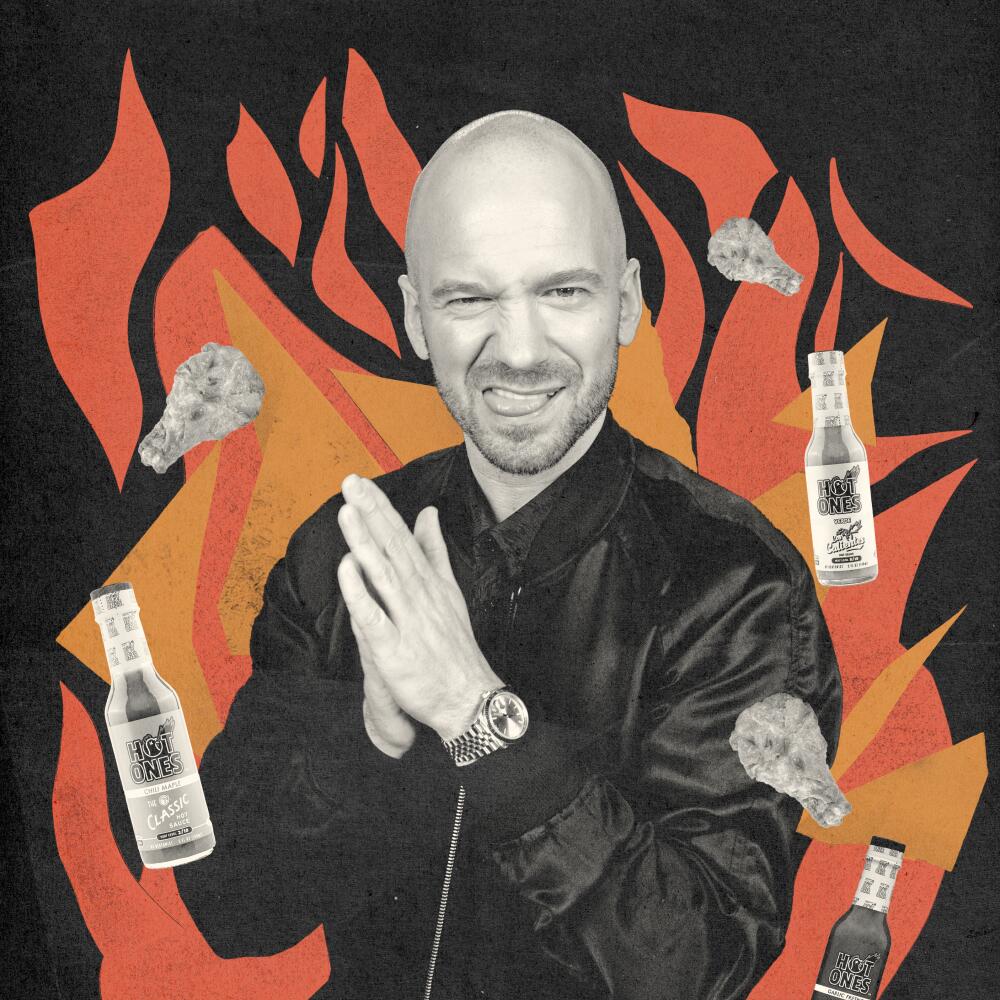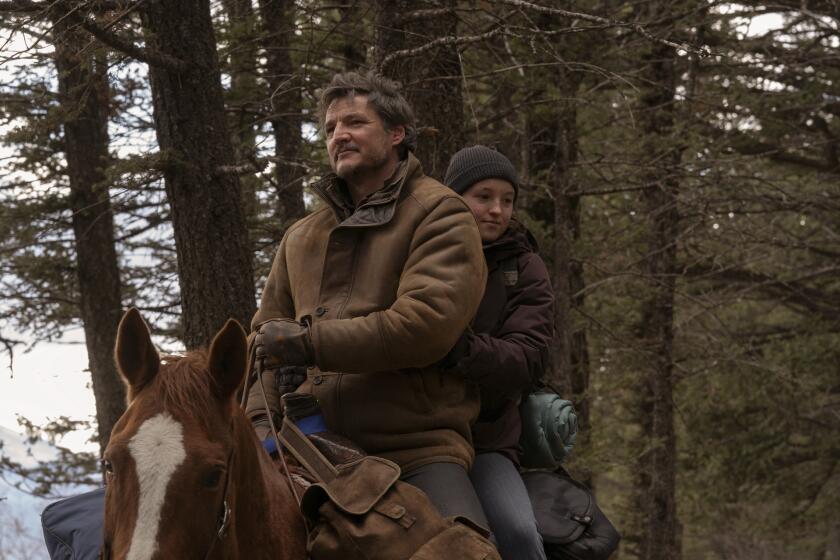
- Share via
In a recent episode of “Hot Ones Versus,” actor Hailee Steinfeld looked at her “Sinners” co-star Michael B. Jordan with a mix of shock and amusement, and asked, “What the f— is this? This is press for our movie?”
It’s a question that has likely been asked before in the 10 years that “Hot Ones” (and subsequent spinoffs like “Versus”) have been pushing out episodes on YouTube. The concept is both simple and outrageous — an interview done while guests eat a series of chicken wings of increasing spice levels, often with disorienting discomfort — and the show has become a popular sensation and an essential stop on the modern celebrity promotional tour.
“Hot Ones” host and co-creator Sean Evans, 39, has been there for the entire ride, eating wings right along his guests, which have recently included Selena Gomez, Bill Murray, Lady Gaga, Bad Bunny, Ben Stiller, Serena Williams, Cate Blanchett, Demi Moore and, in a particularly memorable appearance, Conan O’Brien.
The show has also become a great business, as last year Evans and co-creator Chris Schonberger were part of a group of investors who bought First We Feast, the studio behind “Hot Ones,” for more than $82 million.
Long past its origin as an online upstart and continuing its move into the mainstream, the show is eligible to compete for an Emmy in the talk series category against the likes of Jon Stewart, Jimmy Kimmel, Seth Meyers and Stephen Colbert.
Based in New York City, Evans sat for an interview with The Envelope while recently in Los Angeles.

How has the pitch to talent changed over the years? People presumably get the premise now?
The most profound way that it’s changed is now we’re taking the pitches. There was a time where we had to be very persuasive, almost to the point of tricking people into doing the show. And now the tables have completely turned. You even just see it in the way that people sit down. I remember very early on there was always this challenge for me to win over the guest in the first couple of wings and make them understand that this is going to be ... very different from what they’d expect from what’s written on paper.
A lot of times guests came in with some sort of preconceived notion for how it would go and then had their minds changed just over the course of doing the interview. We actually have a name for it. We call it the “Charlize Theron Shoulder Drop,” because when she came on the show, I remember she was kind of side-eyeing her publicist. And I remember her saying something like, “Am I gonna have to eat all of these?” And by the second or third wing, her shoulders had dropped. She was completely loose. And to me, it’s one of the most important tentpole episodes that we’ve ever created.
How would you describe the vibe of what you’re looking for? What is that feeling you want in the room?
Early on, it was kind of gonzo-ish. But in the time since, what I’m looking for is something real. I think what happens is guests are in a PR-driven flight pattern, and what you want is something very real to happen. And on “Hot Ones” you have those moments of people who are struggling, who are vulnerable, who are in a borderline state of panic. You have emotions that are real, and all of these things are so hard to get to in a traditional interview setting. The fact that we can create these moments, and then combine it with this thoughtful career-spanning interview, all of those elements working together, it just gives you a unique look at the celebrity guests. And, of course, celebrity is this lifestyle that by definition is unobtainable. But what we’re doing is knocking them off of that pedestal down to a level that everyone can relate to. It’s very human. And that’s what people respond to in a lot of ways. I think we accidentally invented the “What’s it like to have a beer with this person” show.
What does it mean to be competing for an Emmy?
It’s never really something that I wrapped my head around or thought was even possible, but they’re opening up the eligibility, which I think is overdue and inevitable anyway. So then it was just about getting the paperwork together and putting together a submission and hoping for the best. But I do think that when you look at the shows that have defined this category for so long, the throughline with all of them is that they’re the cultural reference point for where you can see celebrities in a looser, edgier environment. And “Hot Ones” satisfies that definition. ... I didn’t know that we’d be a part of the conversation, never dreamed of it. But now that we are, I’ll say with my full chest that we belong.
Just physically, after 10 years, is the show difficult for you to continue to do?
The nice thing about spicy food is you develop a familiarity with the things that are uncomfortable. And I’ve been there so many times that I know that there’s light at the end of the tunnel. I think that it’s been overall a net positive because I take so much better care of myself outside of the show than I otherwise would. I do have a clean bill of health and go to the doctor every year and have them hook me up to everything and do every kind of blood test, because I have this unique vocation, this unique lot in life, this unique path that I’m on. But also, there’s lots of jobs where people have had long careers even though there’s a physical toll to it. Ray Lewis played 17 years in the NFL, and he was out there playing linebacker every Sunday. How bad can a couple wings be?
More to Read
Sign up for The Envelope
Get exclusive awards season news, in-depth interviews and columnist Glenn Whipp’s must-read analysis straight to your inbox.
You may occasionally receive promotional content from the Los Angeles Times.











